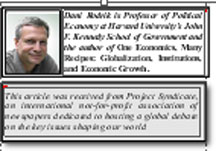By Dani Rodrik
CAMBRIDGE – Everybody agrees that the world economy is ill, but the diagnosis apparently depends on which corner of it you happen to inhabit.
In Washington, accusing fingers point to China, blaming its currency policy for causing large trade imbalances and “destroying jobs” in the United States. Go to Seoul or Brasilia, and you will hear complaints about the US Federal Reserve’s hyper-expansionary monetary policies, which are leaving emerging markets awash in hot money and raising the specter of asset bubbles. Ask in Berlin, and you will get an earful about the absence of fiscal probity and structural reforms elsewhere in Europe or in the US.
The fault, dear Brutus, is neither in our stars nor in ourselves. Thanks to globalization, it lies in our trade partners!
Self-serving as it may seem, this viewpoint is not without some merit. As economies become intertwined, decisions taken in one part of the world reverberate in other parts, often producing unintended consequences.
The fires of the US sub-prime mortgage crisis were stoked not just by domestic regulatory failures, but also by a global “saving glut,” which sent banks on a wild goose chase for yield. The US crisis promptly turned into a global meltdown thanks to the commingling of balance sheets across jurisdictions.
The absence of global institutions – acting as lender of last resort or serving up coordinated fiscal stimulus – aggravated the crisis and delayed the recovery. And now, go-it alone fiscal, monetary, and exchange-rate policies are spilling across national borders, threatening currency wars and protectionism.
How we deal with these challenges is the greatest economic question of our time. One approach, favored by technocrats and most policymakers – at least until domestic politics intrudes – is to seek solace in ever-greater global governance. Global problems, after all, require global solutions, which means strengthening international organizations like the International Monetary Fund, increasing the effectiveness of global forums such as the G-20, and negotiating stricter international codes and standards (as has occurred with capital-adequacy requirements, for example).
Another approach is to recognize that global governance is bound to remain incomplete, and to moderate the side-effects through a more cautious form of economic globalization. This strategy entails throwing some sand in the wheels of the global economy in order to expand room for domestic policy and limit the impact of adverse spillovers from other countries’ actions. This option may seem protectionist, but it could ultimately ensure a more durable globalization.
Many of the world economy’s troubles today originate from our unwillingness to recognize that domestic policy objectives will ultimately trump global responsibilities, no matter how much we pretend that they can be subsumed under international commitments. Consider a couple of examples.
The Uruguay Round of the World Trade Organization was widely hailed as a great achievement, because it brought subsidies and many other types of industrial policies practiced by developing nations under strict international discipline. But WTO restrictions simply led governments to pursue similar objectives through other means.
This had some fatuous implications in the case of China. Once China became a member of the WTO in 2001, it could no longer rely on explicit tariffs and subsidies. So it began to promote its industries through an undervalued currency instead. China’s current-account surplus rose by leaps and bounds, stoking global macroeconomic imbalances and, with them, tensions in the US-China economic relationship.
The world economy would have been better off with fewer restrictions on the use of industrial policies by China (and other developing countries). And, looking ahead, if the rest of the world wants China to accept greater multilateral oversight of its trade balance, there will have to be a quid pro quo of some kind – perhaps an exemption from WTO rules on subsidies.
Similarly, when emerging markets opened themselves up to financial globalization, they reasoned that capital flows would facilitate their economic development. They thought that appropriate macroeconomic policies and prudential regulations (along with support from international financial institutions) would help them deal with any adverse effects. But financial markets have turned out to be fair-weather friends: nowhere to be seen when most needed.
That has forced developing countries into costly attempts to protect their economies from financial markets’ fickleness. Worse still, they have had to adopt strategies – such as currency intervention and accumulation of foreign-exchange reserves – that export financial instability to others. It would have been better to avoid all this by exercising much greater caution in opening up to global finance in the first place.
Those who advocate greater global governance warn us that, without tighter international economic rules, a free-for-all will leave all countries worse off.
But it is a mistake to imagine the world economy as if it were like, say, global climate – with its health and stability ultimately depending on the pursuit of universal instead of parochial objectives.
Economists teach the virtues of open trade because it benefits us – not because it benefits others. Exposing the domestic economy to global markets – unlike curbing emissions at home – brings its own rewards. A world economy made up of countries that pursue their own national interests will perhaps not be hyper-globalized, but it will, by and large, be an open one.
Certainly, the global economy needs some traffic rules where there are clear cross-border spillovers. But the balance between national prerogatives and international rules must make a virtue of political reality.
If we veer too far toward global governance, we will end up with meaningless rules that beg to be flouted.






